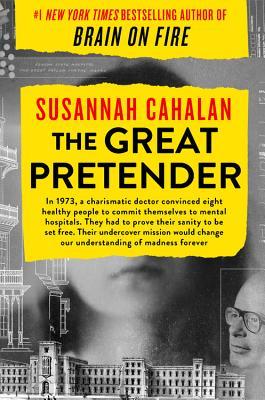
Title: The Great Pretender
Author: Susannah Cahalan
Published: November 2019, Grand Central Publishing
Format: ARC Paperback, 400 pages
Source: Publisher
Summary:
From “one of
America’s most courageous young journalists” (NPR) comes a propulsive
narrative history investigating the 50-year-old mystery behind a
dramatic experiment that changed the course of modern medicine.
For centuries, doctors have struggled to define mental illness-how do
you diagnose it, how do you treat it, how do you even know what it is?
In search of an answer, in the 1970s a Stanford psychologist named
David Rosenhan and seven other people — sane, normal, well-adjusted
members of society — went undercover into asylums around America to
test the legitimacy of psychiatry’s labels. Forced to remain inside
until they’d “proven” themselves sane, all eight emerged with alarming
diagnoses and even more troubling stories of their treatment. Rosenhan’s
watershed study broke open the field of psychiatry, closing down
institutions and changing mental health diagnosis forever.
But,
as Cahalan’s explosive new research shows, very little in this saga is
exactly as it seems. What really happened behind those closed asylum
doors, and what does it mean for our understanding of mental illness
today?
My thoughts: I don’t read a lot of nonfiction, but when I saw that this was going to be available at BookExpo this past Spring, I knew I had to get a copy. This was a fascinating look at the mental health system and it brings up a lot of questions.
I actually haven’t read Susannah’s prior book, Brain on Fire, yet, though I definitely have it on my list. It was all that went on with that, almost being misdiagnosed with a mental disorder, that eventually led to her reading an article called, “On Being Sane in Insane Places” by David Rosenhan, published in 1973. That article sparked a desire to find out who the pseudo-patients were and how they got themselves admitted to different hospitals and then, how they eventually got themselves either cured or released.
I found this all to be incredibly informative, though I will say at times, it is very in-depth and a bit clinical. This book is pure nonfiction and it reads that way. But, I was utterly fascinated by it, and found myself thinking of the book when I had to put it down and I’m not usually a nonfiction reader, so that says something.
I am hesitant to recommend this as it certainly isn’t for everyone, but if you are curious about the mental health system or like Susannah Cahalan’s writing, I certainly suggest picking this one up. I will definitely be reading her memoir, Brain on Fire very soon and will absolutely be keeping an eye out for what comes next from this author.
This sounds great, though I might struggle with it depending on how clinical it gets, it still seems like a worthwhile read. Great review!
Educative too and frightening. I think that some aspects of attitudes still remain in my country upto date.